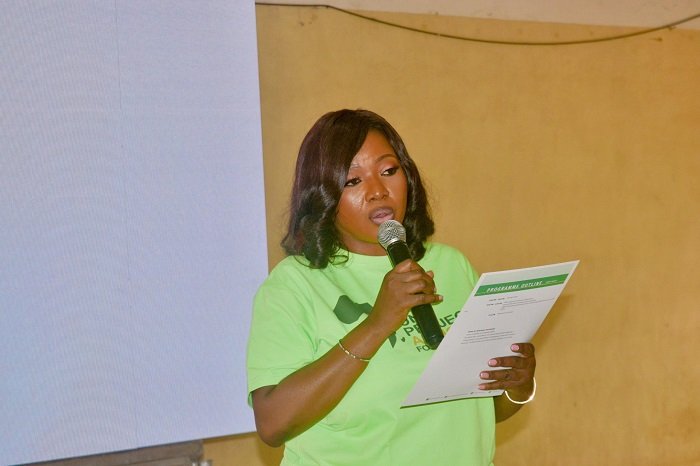News
Rev Prof Paul Frimpong-Manso bows out after 40 years… Assemblies of God of Church pays homage

• Rev Prof and Rev Mrs Frimmpong-Manso (right) receiving a plaque from Rev. Dr.
and Rev. Mrs Stephen Wengam
Having dutifully served the Christian community for over 40 years and having reached the time to bow out, a send-off service was held in Accra at the weekend for the past General Superintendent of the Assemblies of God (AG) in Ghana, Rev. Prof. Paul Frimpong-Manso, and his wife, Rev. Mrs. Gladys Frimpong-Manso.
The ceremony was held to honour their over 40 years of service to the church, having served as local officers through to the top.
Touting the dedicated services he has provided to the church over the years, the General Superintendent, AG, Ghana, Rev. Dr. Stephen Wengam, referred to his predecessor as a man of many parts as he made great strides during his tenure.
He said Rev. Prof. Frimpong-Manso mobilised local assemblies in the church for remarkable endeavours and repositioned them as key Christian denominations in the country.
Again, Rev. Dr. Wengam noted that his predecessor was able to build 3,000 churches within five years, which had led to phenomenal growth in the church.
“During his tenure as pastor at the Gospel Centre AG, Old Tafo, he assisted in raising church membership from 50 to more than 1,000 and planted 12 strong branches in the Old Tafo area,” he added.
Rev. Dr. Wengam stated that it was during Rev. Prof. Frimpong-Manso’s tenure that the church saw the construction of an ultra-modern head office complex, a technical university, the establishment of the AG Ministers’ Pension Board, and the setting up of the AG Television Station.
The King of Akyem Abuakwa, Okyenhene Osagyefuo Amoatia Ofori Panin, who was the Special Guest of Honour, said the church, the Christian Council, and the country at large were privileged to have a man after God’s own heart.
He emphasised that Rev. Prof. Frimpong-Manso was a man with vision, integrity, and an understanding and adept knowledge of the word of God, adding that his service to God and man had strengthened Christians in the country.
“As you officially retire from active duty, me, my wife and family, and the entire Okyeman appreciate and send you our best wishes.” After all your hard work and dedicated services to God and humanity over the years, I am glad you are retiring , and I appreciate you for being an exemplary, bold leader for the past decade,” he added.
Rev. Prof. Frimpong-Manso remarked that the successes chalked during his tenure were by the grace of God and added that, though he was retiring, he would continue to serve God and the church.
He used the opportunity to urge young pastors to seek the face of God in all the decisions they made. He added that success could only be guaranteed by God and not man.
By Spectator Reporter
News
Penile implant a cure for Erectile Dysfunction
Men in Ghana, including those as old as 80 are suffering from conditions like hypertension and diabetes, now have a reliable treatment option for Erectile Dysfunction (ED), which is penile implant surgery.
In an interview, a Consultant Urologist and Sexologist, Dr Samuel Amanamah, shared that 52 per cent of men aged 40–70 were affected by ED in varying degrees.
He described ED, referred to as impotence, as the persistent inability to achieve or maintain an erection sufficient for sexual intercourse.
The condition, he stressed, has contributed to marital breakdowns, low self-esteem, and even infertility.
“Men in this situation can now breathe a sigh of relief,” Dr Amanamah said, adding that, “Age or chronic conditions like diabetes are no longer barriers to treatment. Even 80-year-olds have successfully undergone the procedure.”
The penile implant was considered the final treatment option for men when all other interventions, including oral medications, injectables, and medical devices fail.
The procedure involved inserting a silicon rod into the erectile tissues of the penis, providing an immediate and controllable erection, stating that there were two types of implants: malleable, which is always firm, and inflatable, which allows the user to regulate erections.
Dr Amanamah mentioned that the surgery required only a small 4cm incision beneath the penis.
“The incision site is barely visible after healing,” he said, adding that the minimally invasive procedure usually lasts an hour. Patients are typically discharged within one or two days.
Aesthetically, the penis remains unchanged after the procedure, and it is almost impossible to distinguish between one with an implant and one without, he noted.
“Functionally, the implant is even superior to natural erections,” he underlined. “It can last over 20 years and allows for intercourse as often as the patient desires.”
He added that patients can still father children after the procedure, provided they do not have underlying fertility issues.
“Some patients who suffered from 10 years of infertility have gone on to have twins after the surgery,” he noted, adding that others have reconciled with spouses after being previously divorced due to ED.
Although complications were possible, the success rate of penile implants was as high as 93 per cent, Dr Amanamah emphasised, stating that occasional erectile failure does not qualify as ED.
He also outline that the dysfunction must be persistent. “Some men start with a good erection but lose it during intercourse. That still counts as ED.”
Furthermore, he explained that ED can stem from various causes, including cardiovascular issues, neurological disorders, hormonal imbalances, and chronic conditions like hypertension and diabetes.
Psychological factors such as unresolved marital problems also play a role. Conditions like priapism, that is, prolonged erection often linked to sickle cell disease or abuse of sex-enhancement drugs could also result in ED if not promptly treated.
Moreover, Dr Amanamah underscored the importance of treating the root cause noting that “simply giving medication without addressing underlying issues only delays the problem,” and added that “effective treatment must be holistic.”
“When oral or injectable medications and medical devices fail, the penile implant remains a safe and long-term solution for restoring sexual function and quality of life,” he noted.
From Ama Tekyiwaa Ampadu Agyeman, Koforidua
News
Psychological distress rises among teenage girls

The Mental Health Authority of Ghana has recorded rising psychological distress cases among teenage girls in the country.
The rise, according to the authority, is linked to academic pressure, family issues, gender-based violence, and isolation.
This was disclosed by Victoria Naema Abdulai, the founder of the One Project Africa Foundation (OPAF), a non-profit organisation focused on empowering women and girls.
Ms Abdulai said this at a mental health awareness session organised by the foundation for students of the Accra Girls Senior High School in Accra.
It was held under the theme “Empowering Her Mind, Voice and Power: Fostering a Resilient Tomorrow for the Girl Child through Mental Wellness,” which was aimed at building self-awareness, promote emotional healing, and encourage resilience among young girls.
She stated that mental health was not a luxury but the foundation on which every girl’s future should be built
Ms Abdulai said despite the rising need, mental health remains one of the most misunderstood and neglected issues in our society.
She said without mental wellness, young girls will continue to struggle silently with learning, dreaming, and relating to others, warning that the lack of attention to girls’ mental health is costing society their potential.
She urged students to embrace their emotions and seek help when struggling. “You are not weak for having emotions. You are human. Seeking help does not make you a failure, it makes you courageous.”
Touching on what the foundation does, Ms Abdulai said the foundation teaches girls how to pass exams but not how to process pain, obey instructions but not how to handle rejection. We are obsessed with excellence but ignore the exhaustion.”
A Mental health practitioner and addiction specialist, Esther Kyewaah Opoku, on her part stated that mental health was not separate from general well-being but central to it. “Without your mental health, you are not healthy,” she said.
She mentioned that adolescence is a fragile period, with the brain still developing until age 25.
She disclosed that one in seven adolescent girls in Ghana has a mental disorder, with 26 per cent experiencing depression, 29.8 per cent emotional distress, and 14.8 per cent suffer trauma or behavioural issues.
She also blamed these conditions on peer pressure, bullying, sexual abuse, and toxic comparisons driven by social media. “We are sitting on a time bomb,” she said, urging early intervention and compassion.
According to her, adolescence is a critical stage of mental and emotional development, during which the executive brain, or forebrain, continues to form until age 25.
“This period is filled with vulnerabilities that, if unmanaged, can lead to lifelong challenges,” she said.
Ms Opoku therefore called for compassion, peer support, and continuous education on mental health to break the cycle of silence and stigma, particularly among young girls, saying “nobody should feel alone or hopeless.”
By Stephanie Birikorang






